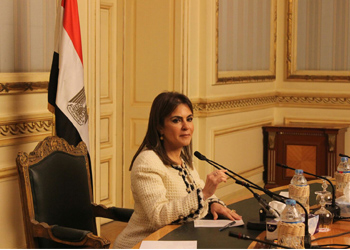In a heated debate Sunday, Egypt’s MPs accused Minister of Investment and International Cooperation Sahar Nasr of drowning the country with too much foreign loans, but the minister fired back, saying most recent loans were obtained by the private sector and stressed loans are still necessary for economic development.
MP Alaa Abed, head of parliament’s human rights committee and the spokesperson of the Free Egyptians Party, asked Nasr “Are you a minister for boosting investments or a minister for obtaining too much loans and plunging Egypt into debts?”
Abed argued that “the foreign borrowing policies of the ministry of investment are very bad and will leave future generations in Egypt burdened with huge debts.”
Abed wondered why the Ministry of Investment has so far refrained from using a German grant valued at 500 million euros. “It is a grant which will expire at the end of this year, and in spite of this fact the ministry opted to resort to obtaining loans again,” said Abed.
Nasr disputed Abed’s claim that Germany has decided to offer Egypt 500 million euros in a grant. “This is a loan and not a grant, and it was used to support Egypt’s economic reform programme with the IMF,” said Nasr.
At one point in the debate, Speaker of parliament Ali Abdel-Aal intervened to support Minister Nasr, indicating that the government and parliament are both responsible for deciding whether the country should obtain foreign loans or not.
“According to the constitution, the president and the government are the ones authorized to sign foreign loan agreements and it is the responsibility of parliament to discuss these agreements and vote on them,” said Abdel-Aal, adding that “so it is a joint responsibility and nobody can claim that a certain minister has pushed Egypt into taking too much foreign loans.”
The debate on foreign loans comes as parliament discusses proposed amendments to the 1981 law on joint venture companies. The amendments aim to help the country attract greater volumes of foreign direct investments in terms of eliminating many of the obstacles which face investors.
A parliamentary report concluded the proposed amendments go in line with recommendations issued by the World Bank and the World Economic Forum on investment and competitiveness.
“The amendments also help small-scale investors form the one-person companies or the limited responsibility companies which have become a big success in many countries,” the report said.
Abed said it is regrettable that “it has almost become a daily routine that citizens in Egypt read in newspapers that the country’s foreign debts have ballooned too much. “They say the debts have become too big thanks to the Minister of Investment and that she should rather be called “the Minister of Debts and Loans,” said Abed.
Leftist MP Abdel-Hamid Kamal also asked minister Nasr to provide parliament with a detailed statement on Egypt’s foreign debts. “This statement should make it in clear words how much Egypt’s foreign debts have increased in recent years,” said Kamal, adding that “I believe that foreign debts increased from $28 billion in 2011 to around $80 billion at present.” “This should ring alarm bells because no country can live on loans all the time and that the ministry’s job is to attract investments, not borrow from foreign banks and governments,” said Kamal.
In response, Nasr said that foreign loans which the ministry of investment and international cooperation has obtained since she took office in September 2015 represent just 7 per cent of the country’s total loans. “And even 40 per cent of these loans have become grants,” said Nasr.
Nasr also indicated that most of Egypt’s debts are owed by the private sector. “Please, MPs you should have the correct figures before you raise questions on Egypt’s foreign debts,” said Nasr.
“What many do not know is that the private sector is the largest recipient of foreign loans,” Nasr explained.
“In a recent conference on banking in Africa in Sharm El-Sheikh, you should have noticed that most of the foreign loan agreements were signed with banks to give the money to private sector,” said Nasr.
Nasr, however, said foreign loans are still necessary because Egypt does not have the funds required to develop infrastructure projects.
“In this respect, I think that MPs should direct their questions to ministers who took loans to develop infrastructure in their sectors,” said Nasr, adding that “for example, you should ask minister of housing if he took a loan for improving sanitary drainage projects in upper Egypt.”
Nasr said the minister of finance and the governor of the Central Bank of Egypt are the ones who can provide a detailed statement to parliament on foreign loans and how they are being used.
Abdel-Aal argued that “it is not bad that governments borrow foreign money to build projects.”
“International relations dictate that countries borrow from each other,” said Abdel-Aal, adding that “just like it obtains loans from foreign governments and banks, Egypt also gives loans and assistance to some foreign governments.”
“It is a two-way direction and not one way as some think,” said Abdel-Aal.
Source: Ahram Online


